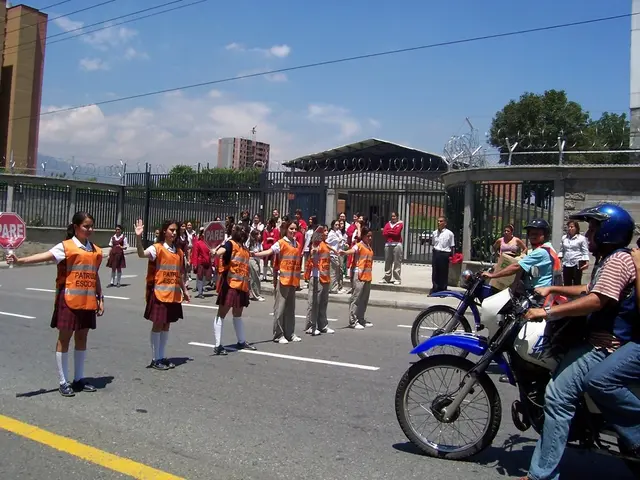Inventive Icebreakers for Buildings Bond within Caregiver Networks
Ready to shake things up in your caregiver support group? Let's be real, caregiving ain't easy. Emotions run high, and sometimes you need a little help breaking the ice. That's where these 10 simple and effective icebreakers come in. They'll make everyone feel welcome, get them chattin', and help build that all-important sense of community.
So, when you're staring down the barrel of a silent room, don't sweat it! Grab your group, and give one of these bad boys a go:
1. Spill the Beans on Your Week
Everyone shares a single word that sums up their week—you might hear words like "draining," "rewarding," or "tough." This quick fire starter helps people get a sense of what others are going through without diving headfirst into the deets just yet. If the group's small, have another round with the chance to delve deeper into why they picked their word.
Why it works: This icebreaker lets people ease in without feeling pressured to share too much. It's also a great way for the group leader to get a feel for the group's energy.
2. Two Truths and a Lie (Caregiver Edition)
Each person shares three "facts" about themselves, two true and one made up, and the other group members guess which one's the fib. Make it fun by encouragin' caregiving-related fibs.
Why it works: This activity injects a bit of humor and curiosity into the group, helping lighten the mood while allowing everyone to learn a bit more about each other.
3. What's Your Secret Weapon for Dealing with Stress?
We all have our go-to methods for unwinding. Whether it's a martini, a manicure, or a meditative stroll, share 'em! Not only does this help everyone get to know each other, but you might just nab a new stress-bustin' trick.
Why it works: Sharing stress relievers can be a total game changer for caregivers. You might find a new way to unwind, or just feel better knowin' others are in the same boat.
4. Highs and Lows, Baby!
Each person shares one high point and one low point from their week. This is a great way to hopscotch between positive and challenging moments, helping everyone stay balanced, and giving a glimpse into what others are dealing with.
Why it works: Highs and Lows give people a chance to share something positive along with something challenging, which can create a sense of balance.
5. Sum It Up – Your Caregiving Journey in a Nutshell
Each person sums up their caregiving experience in a single sentence. It might sound like "I care for my mom who has diabetes," or "I'm a caregiver for my partner with MS." This quick intro helps everyone get a feel for each other's caregiving roles before diving deeper.
Why it works: This exercise is especially useful for new groups, as it lets everyone learn the basics about each other's caregiving roles without goin' overboard with the deets.
6. Share the Love with Gratitude
Ask each person to share one thing they're grateful for that day. This does not have to be something huge—sometimes, just bein' grateful for a beautiful sunset can make a world of difference.
Why it works: In caregiving, it's easy to get caught up in the hard stuff. Quick gratitude-sharin' sessions can help shift everyone's mindset and bring out some positive vibes.
7. What's Next on the Agenda?
This one asks each person to share one thing they're lookin' forward to. This could be a family visit, a break, or a favorite TV show. This lighthearted question helps remind everyone that there's life beyond caregiving.
Why it works: When everyone shares somethin' they're excited about, it reminds the group that there's more to life than caregiving, which can feel like a breath of fresh air.
8. Lessons Learned: Caregiver Edition
Ask each group member to share one lesson they've picked up from their caregiving journey. Responses might include "patience," "organization," or "humor." This question lets everyone bond over the wisdom they've gained from navigatin' the caregiving world.
Why it works: Not only does this activity make each person feel valued, but it also helps others learn new perspectives. Plus, it's always good to have a reminder that we're all in this crazy caregiving life together.
9. If I Was a Superhero Caregiver...
Ask each person (imaginatively) to choose their superpower to make caregiving easier. Answers might range from "the ability to be in multiple places at once" to "the power of infinite calm." This question lets people get a lil' creative and imagine what life would be like with a few superpowers.
Why it works: Addin' some humor to the mix can help relieve tension and make everyone feel a bit more at ease. Plus, it's always fun to dream, right?
10. A Memory That Puts a Smile on Your Face
Each person shares a memory that brings a smile to their face. It doesn't have to be caregiving-related—it could be a funny story from childhood or a sweet vacation experience. This quick reminder that there's joy to be found in life is just the trick for helpin' lighten things up.
Why it works: By sharin' a happy memory, everyone gets a reminder that there's more to life than just caregiving, which can help create a stronger bond amongst the group.
Wrapping Up
Caregiver support groups can provide a much-needed sense of community and a touch of relief from the challenges of caregiving. But kickin' things off ain't always easy, especially when emotions are high. These 10 icebreakers are designed to help everyone feel more comfortable, build trust, and get to know each other in a supportive environment.
Give 'em a go, and watch your group blossom!
P.S. Remember, caregiving ain't for the faint-hearted. So take it easy on yourself, and celebrate every small victory—whether it's makin' it through another day or carvin' out five minutes to sip some coffee in peace. You're doin' an amazing job!
Enrichment Data:
Advice and Key Takeaways:
- Embrace Vulnerability: Icebreakers help create a safe space for individuals to feel comfortable opening up. Allow members to share challenges, success stories, and personal experiences to foster a sense of community.
- Keep it Fun and Lighthearted: Incorporate humor and games to ease tension and create a positive environment.
- Respect Privacy: Be mindful of sensitive topics. Opt for open-ended, non-judgmental questions to encourage participation without putting anyone on the spot.
Icebreaker Activity Ideas:
- Jump in Place - Physical Activity: Encourage group members to jump in place for 30 seconds, then have a short discussion about the benefits of exercise for mental and physical health.
- Famous Caregiver Characters - Quick Trivia: List famous fictional or historical caregivers, such as Caroline Ingalls (Little House on the Prairie) or Jean Valjean (Les Misérables). The first person to identify the character receives a prize.
- If I Could Trade Roles - Fantasy Scenario: Imagine swapping roles with a famous person for a day. Players share their choices and discuss why they'd choose that role.
- The Post Card Game - Sharing Memories: Create a postcard template and ask players to write about a memory or achievement that makes them proud. Share postcards with the group, and discuss what makes these moments important.
- Caregiver Superheroes - Group Discussion: Discuss characteristics that make a caregiver a "superhero." Use this conversation as a chance to highlight group members' strengths and offer appreciation.
In a caregiving context, science and health-and-wellness can be integrated into icebreaker activities to foster mental and physical well-being. Here are two sentences that incorporate the given words:
- To encourage ongoing learning and support within the group, consider introducing a rotation of mental-health focused topics each meeting, such as stress management techniques backed by scientific research or the benefits of regular exercise for both caregiver and care recipient.
- As the group builds camaraderie, consider incorporating activities that promote self-care and self-awareness, such as a group meditation session guided by a health and wellness expert or discussions on mindfulness practices backed by scientific evidence.








